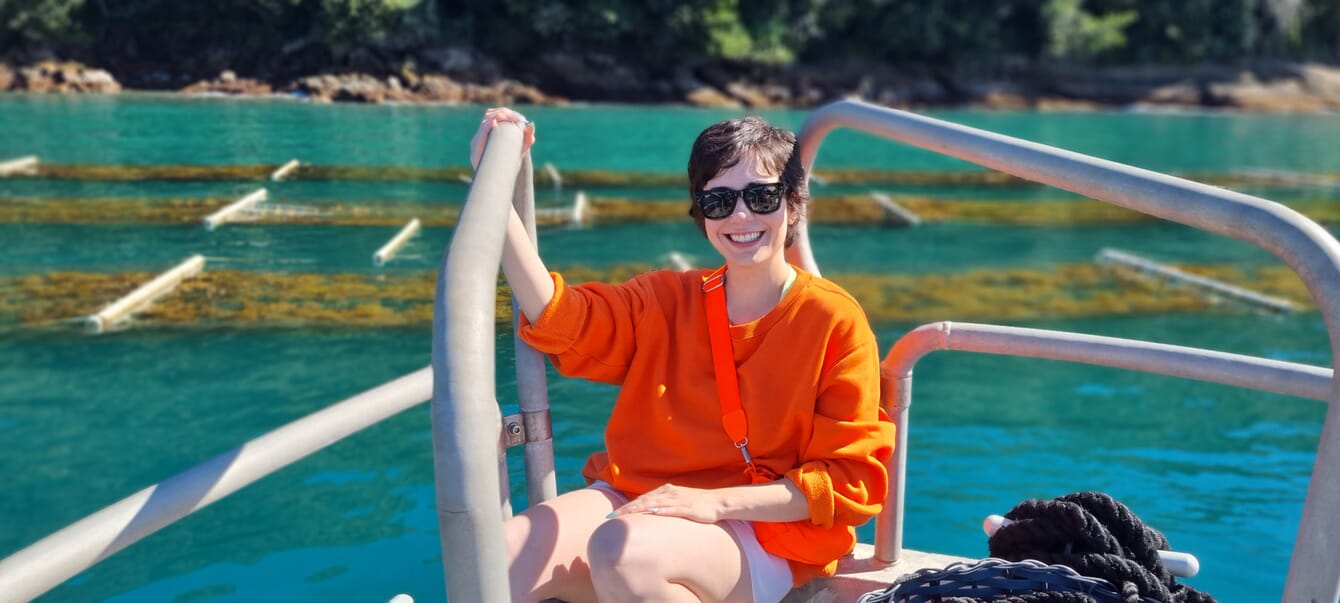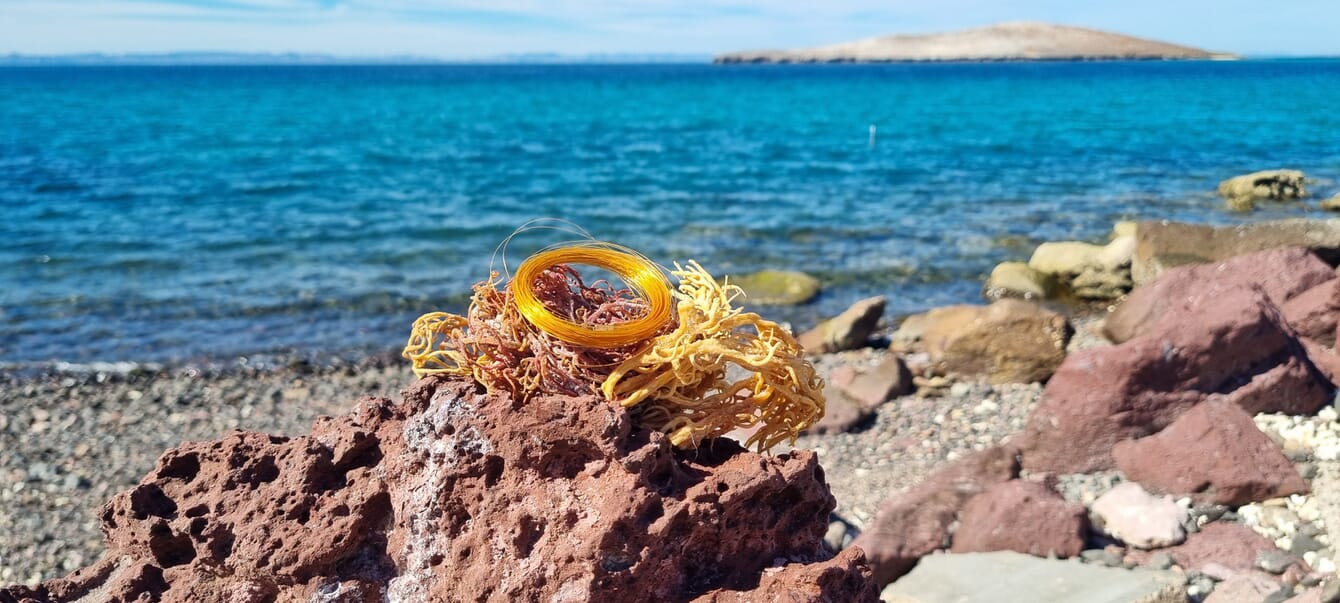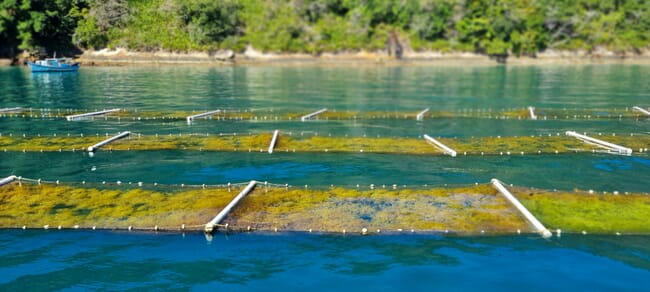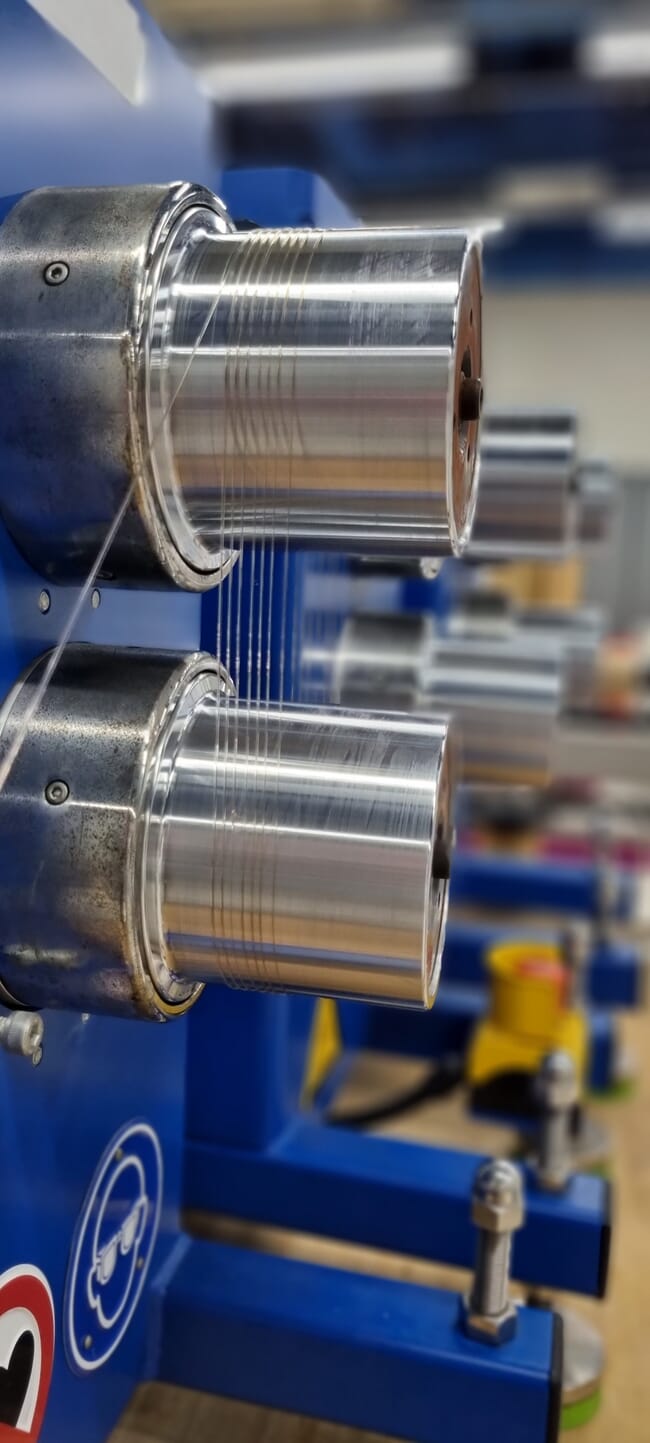
Thamires Pontes has spent too long in the fashion industry to simply sit back and ignore its problems.
The textile designer, who’s spent just over a decade in the textile industry, is thoroughly disillusioned by the negative impacts of industrial fabric production and is desperate to help find alternatives to the status quo.
“Visiting factories in China was crazy – they’re huge and I started to feel frustrated about how polluting the industry is: so much water is used, so many chemicals,” she reflects.
“The fashion industry faces significant challenges, all of the fashion value chain is terrible, but working with farmed seaweed we can guarantee our traceability and solve the biggest problem of the fashion industry,” she adds.
An unlikely inspiration
Pontes first started investigating the use of seaweed in textiles while doing her masters in 2016. Somewhat surprisingly, she was initially inspired to look into the use of alternative organic fibres by one of Brazil’s leading chefs, Alex Atala, whose molecular gastronomy included making spaghetti out of ingredients such as chocolate, rather than wheat.
“I realised that if he could make something that looked like yarn out of these substances then I could make my own yarn out of something completely different,” Pontes recalls.
In the course of her master's thesis, she discovered several academic papers discussing the use of seaweed in textiles. Utilising these findings in combination with her own knowledge, Pontes began developing her first products.
This approach diverged from the initial guidance of her professors, who strongly argued that brown seaweeds, with their high levels of alginates, were more suitable for fibres than the hydrocolloid-containing red varieties. Nevertheless, she persisted.
“Alginate in Brazil is super-expensive and we don’t have a lot of brown seaweeds, as the water is warm, which is why I didn’t want to work with it,” she explains.

© Phycolabs
After taking part in a number of accelerator programmes, Pontes felt she’d developed entrepreneurial skills to match her academic ones and was confident enough to found Phycolabs in 2022.
“As part of our mission, we combine economic development with support for our coastal communities, the fashion industry, nature, and science,” Pontes enthuses.
According to the founder, most of the seaweed farmed in Brazil is currently processed into agricultural biostimulants, but the uptake is limited and growth in the biostimulant sector is slow, which is inhibiting the expansion of seaweed cultivation.
However, she believes that if she’s able to produce a seaweed-based product that can compete with commodities, then this could really catalyse the growth of the sector.
Moreover, as she points out, Phycolabs can use any of the seaweed – be it whole crops or side-streams from seaweed that’s been processed for other uses – meaning that she can help to generate good value for most seaweed crops.
“We can use the waste from seaweed biostimulant production, we can use wet seaweed, we can use dried seaweed,” she reflects.
“We only worked with farmed seaweed as it guarantees the quality and means we can plan the production and support the seaweed growing communities,” she adds.
Pontes also anticipates abundant access to locally-farmed seaweed, thanks in part to the favourable political climate.
“The Brazilian government is increasing its support for the blue economy,” she notes.

Phycolabs hopes to help provide livelihoods for coastal communities in Brazil © Phycolabs
The business model
Once they've secured ample funding, Phycolabs plans to establish their own factory dedicated to producing threads, yarns and fibres made from seaweed.
“Unlike most of the other operators in the seaweed textile space, we’re not mixing it with cotton, no lyocell, or polyester. It’s only seaweed,” she emphasises.
According to Pontes, this can be done using the same “wet-spinning process” that is used in the production of Rayon and they have now produced both mono- and multifilament versions of their seaweed-fibre and are looking to upscale.
Equally she plans to use 100 percent of the seaweed she buys to make the fibres, although this depends on the way the raw material is processed. As she explains, the startup has developed several different processing methods. At this stage, we are trying to achieve mass balance to make the same biomass as productive as possible, both in processing for yarn and for other byproducts with a good price.
Missing links
Although Pontes has made some good progress, one major unknown relates to the precise properties of seaweed fibre. However, drawing on her extensive textile experience, she expects it will perform much like natural fibres in terms of transpiration, but will look more like conventional synthetic or artificial fibres.
The company will shortly be investing in a small loom for creating their fibres in more significant quantities.
“Then we will be able to see its properties, such as how it is affected by being wet and what’s the performance on the skin,” she says.
“The idea is that we can replace traditional materials, not only petrochemical synthetic fibres but also artificial fibres like Rayon – the value chain that produces Rayon is super, super toxic and it’s one of the biggest materials that China exports to the world and the idea is that we can change this value chain for traceable raw materials that aren’t mixed, so that they can be recycled,” she adds.
Despite her background in fashion, Pontes doesn’t plan to produce any of her own clothes – at least not yet.
“When we’ve talked to our clients they want to produce their own, exclusive fabrics using our threads,” Pontes explains.
Indeed, although they are not yet market-ready Phycolabs is cultivating a “guestlist” of potential clients, who receive regular updates on the startup’s progress.
“Many clients are already signing NDAs and MTAs and this approach is super helpful as the brands can tell us exactly what their requirements are,” Pontes says.
“The fashion industry is one of the most polluting industries in the world and the industry is increasingly looking towards using new, more sustainable materials which can be recycled. Big brands and luxury brands are willing and able to pay the price, but they are concerned about the scalability – that’s the biggest problem with biomaterials in general,” she adds.

© Phycolabs
Upscaling
“At the end of the day fabrics and yarn are commodities so we need to scale up and scale up and scale up to reach a good price,” she emphasises.
As a result Pontes has had to ensure that Brazil’s seaweed farmers will have the capacity to upscale their own production as and when there’s sufficient demand. And she believes that, given the short production cycle and rapid growth of seaweed, this won’t be an issue,
“They can grow the seaweed, with a daily growth rate of 6 percent per day, and the growing cycle is only 30-45 days, compared to 4-7 months for growing cotton,” she points out.
While Phycolabs has been established for three years, Pontes believes that 2024 has marked the most dynamic period in the startup’s existence. They have participated in several significant events such as the invitation-only Biofabricate, Global Fashion Summit, and Future Fabrics Expo. Additionally, they have successfully completed the technology patent process, and their first batch of Phycofiber is scheduled to be produced very soon by a third-party lab in Rio.
"I’m already talking to VCs and I’m looking for as many grants as possible, so that within a year we’ll have our own unique lab and will be able to produce our own fibres in-house, probably with a large pre-seed,” says Pontes.
“My biggest challenge is time – clients are asking me about the product – and my second is money. We’ve been funded by grants so far, which is amazing – there’s been no dilutive equity and we don’t have anyone pushing us,” she adds.
Pontes plans to build the company’s first facility in Brazil.
“The value chain is here, and labour here is efficient too. But different than in the US, there’s less of a culture of being entrepreneurial – people don’t like to work for startups as we can’t pay as much money as other jobs, so it’s hard to keep this talent in-house,” she says.
Once that is up and running Pontes’ ambition knows no bounds.
“Within three years we’d like to be selling already and dressing the world in seaweed style,” she concludes.



